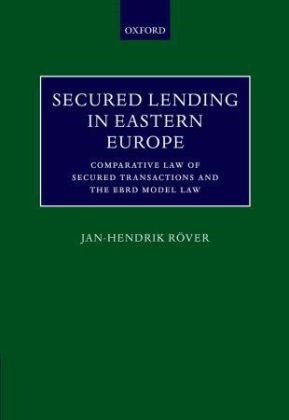Ulteriori informazioni
Zusatztext Undoubtedly fulfils the needs of those seeking a detailed account of secured lending laws in Eastern Europe and is certainly practical in its focus...Dr Röver has produced a work which contains considerable insights into the process and outcomes of law reform efforts and in that respect this is a book which is deserving of a broader audience than those who toil in the field of secured lending. Informationen zum Autor Jan-Hendrik Röver is a managing partner of Asset Capital Partners, an investment banking firm with offices in Munich and Moscow. Previously he headed the equity funds and asset based mezzanine group in the Project and Asset Based Financing division of Bayerische Hypo- und Vereinsbank AG, Munich. For several years he worked in the legal department of the European Bank for Reconstruction and Development (EBRD) in London. There he was involved in the drafting of a model law on secured transactions (1994), which is used by central and eastern European countries for the reform of their security laws. Dr Rover studied law in Bonn, Geneva, Strasbourg, Munich, Speyer and at the London School of Economics and Political Science. He is dually qualified as an attorney in Germany and a barrister in England and Wales. His book on comparative law (Vergleichende Prinzipien dinglicher Sicherheiten, Munich 1999) was awarded both the Jean Rey prize and the Bruno Heck prize. Klappentext This work deals with charges, mortgages, retentions of title and security transfers in seven major jurisdictions in central and eastern Europe. Zusammenfassung This new work is the first comparative study of central and eastern European secured transactions laws to be written in English. It gives a valuable insight into the legal reforms taking place in the transition economies of central and eastern Europe (and elsewhere), explaining the general mechanics of secured transactions laws in a helpful and practical way.The book will explore the characteristics that make security law useful from a practical point of view, the purpose being not merely to describe existing rules on security but to concentrate on the question of how those rules can apply in practice. The author concentrates on seven central and eastern European secured transactions laws in Bulgaria, the Czech Republic, Hungary, Poland, Romania, the Russian Federation and the Slovak Republic. These laws are contrasted with the EBRD's Model Law on Secured Transactions and the EBRD's Core Principles for a Modern Secured Transactions Law. In addition, English, German and US law (which, among others, influenced the EBRD's work) are used as further reference sources....

